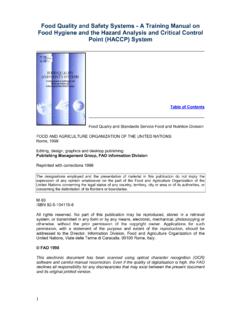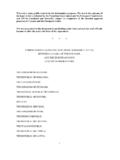Transcription of COVID-19 AND INTERNATIONAL TRADE: ISSUES AND …
1 COVID- 19 and international trade : ISSUES AND ACTIONSIn an unprecedented global health crisis, trade is essential to save lives and livelihoods; and INTERNATIONAL co-operation is needed to keep trade flowing. In the midst of significant uncertainty, there are four things we can do: 1) boost confidence in trade and global markets by improving transparency about trade -related policy actions and intentions; 2) keep supply chains flowing, especially for essentials such as health supplies and food; 3) avoid making things worse, through unnecessary export restrictions and other trade barriers; and 4) even in the midst of the crisis, think beyond the immediate. Government support today needs to be delivered in a way that ensures it serves the public interest, not vested interests, and avoids becoming tomorrow s market distortions. OECD is working with other IOs to support governments through timely and objective evidence and analysis to inform policy choices In a challenging and uncertain situation, trade is essential to save lives and livelihoods COVID-19 is a humanitarian crisis on a global scale.
2 The virus continues to spread throughout the globe, placing health systems under unprecedented stress in the battle to save lives. The human scale of this tragedy is set to worsen as the virus spreads to lower income countries with weaker healthcare systems. In the March 2020 OECD Interim Economic Outlook, the downside scenario saw global growth halved to That was optimistic. We now estimate that for each month that the necessary containment measures continue, the drop in output is equivalent to a decline in annual GDP growth of up to 2 percentage points 2 COVID- 19 and international trade : ISSUES AND ACTIONS OECD 2020 (Figure 1). Moreover, the costs to the global economy from support packages, through central banks and fiscal actions, are very significant and likely to have long-lasting and complex effects on management of sovereign and corporate debt. Yet notwithstanding these efforts, most major economies now look set to enter recession, and more serious scenarios cannot be discounted.
3 A further challenge is the uncertainty about COVID-19 , including in terms of the scale and pace of infection; how long and widespread shutdown measures will prove necessary; the prospects for treatments to better manage symptoms, allowing health services to focus only on the most serious cases; and the risk of second wave infections as the virus moves around the globe. The virus is proceeding in waves, with countries succumbing and set to recover at different times. What is clear is that the virus and its aftermath looks likely to be with us for some time. Against this background, there is a clear need to keep trade flowing, both to ensure the supply of essential products and to send a signal of confidence for the global economy. trade is essential to save both lives and livelihoods. But keeping trade flowing requires co-operation and trust for example, that the market will supply essentials, that countries will not impose export restrictions, and that imports do not pose health risks.
4 This is a particular challenge at a time of trade tensions, where the INTERNATIONAL trading system was already subject to an increased number of new restrictions and distortions, from tariff increases among major traders, to significant government support in key sectors. Efforts at dialogue to manage and prevent tensions through ongoing negotiations are now complicated by mobility restrictions. But in the context of the severe economic strain from COVID-19 , it is more important than ever to avoid escalation of the current trade tensions. Figure 1. COVID-19 is set to have a major impact on economic activity The potential initial impact on activity of partial or complete shutdowns on activity in OECD and non-OECD G20 economies Percentage of GDP at constant prices Note: The sectoral data are on an ISIC rev. 4 basis in all countries apart from Korea and Brazil, where national data are used. Real estate services excluding imputed rent are assumed to be 40% of total real estate services in countries in which separate data are not available.
5 Source: OECD Annual National Accounts; OECD trade in Value-Added database; Statistics Korea; Brazilian Institute of Geography and Statistics; and OECD calculations. -40-35-30-25-20-15-10-50 3 COVID- 19 and international trade : ISSUES AND ACTIONS OECD 2020 Despite considerable uncertainty, there are four actions that can be taken now First, boost confidence in trade and global markets by improving transparency A strong, shared, transparent information base is critical in underpinning sound national policy responses and the INTERNATIONAL co-operation to keep trade flowing. It will be critical that countries honour their commitments to notify trade -related measures taken in response to COVID-19 to the World trade Organisation (WTO). The OECD is sharing information on trade -related country actions on COVID-19 with WTO colleagues, and assessing the likely impact of these actions to help support policy makers dealing with the crisis.
6 Building on our annual Monitoring and Evaluation of Agricultural Policies we are tracking and assessing the impact of country measures in relation to agrifood production and trade in response to COVID-19 . We are bringing this information to AMIS (Agricultural Market Information System), where we work with other INTERNATIONAL organisations and governments to ensure accurate, up-to-date information on market developments and country policies in critical commodities for the global food Second, keep global supply chains going, especially for essentials An important priority is keeping the key supply chains for essential goods for the crisis including medical supplies, food products and ICT goods and services open and functioning. However, we are starting to see a number of challenges to keeping these supply chains going related to the business of trade . For example Cancellation of passenger flights linked to travel bans has limited the availability of air cargo (Figure 2) while urgent shipping of essential goods has increased demand, resulting in increases in the price of air cargo (compared to October 2019 air freight costs are up by about 30% between the People s Republic of China (hereafter China ) and North America and by over 60% on some important Europe-North America routes) (Curran, 2020[1]) Delivery times have also increased.
7 This matters for some time-sensitive medical supplies, but also for some high value food trade . Important shipping ports reported year-on-year drops in cargo between 10% and 20% in February (Baschuk, 2020[2]). Over 50 countries have changed port protocols, ranging from port closure and quarantine measures to additional documentation requirements and examination. That said, some countries have also set up green lanes at ports of entry and border crossings, to accelerate the processing of cargo shipments. At the time the virus struck, large numbers of shipping containers were in Chinese ports, and restrictions on their movement have led to a shortage that has seen the price of containers rise (in some cases considerably), with flow-on effects for the price of cargo, including food products. Lockdowns are also impacting the availability of labour to unload ships at ports (notably in countries where this is less automated) or raised costs due to increased protective measures for workers.
8 More generally, all supply chains are being affected by the need to ensure additional health and safety measures for all participants in the supply chain (which affect costs and time). Limits on mobility of people and lockdowns are affecting a variety of trade processes, from physical inspections of goods for SPS, to testing and certification for TBT, to changing how anti-dumping investigations are conducted. 1 Further information on AMIS is available at 4 COVID- 19 and international trade : ISSUES AND ACTIONS OECD 2020 All of these are adding to the time and costs of INTERNATIONAL trade on products that matter. They will require co-ordinated action amongst governments and with the private sector to find solutions to the logistical constraints affecting the ability to get essential products where they are needed most. An immediate issue is facilitating medical supplies necessary to tackle COVID-19 , many of which are produced across a number of countries and for which trade is the means of ensuring global supply.
9 For example, at the onset of the crisis, China was the main manufacturer of surgical masks, accounting for about one-half of world capacity. Yet in January, this was not enough to meet demand; China stopped exporting masks and imported 56 million masks in the first week of January; masks were also donated to China by some countries. In the midst of the crisis, Chinese demand was estimated at 240 million masks per day (more than ten times its manufacturing capacity). China increased production from around 20 million masks per day to around 116 million per day at the end of February and is now exporting masks to other Figure 2. Sea and air cargo are dropping sharply Source: OECD, drawing on data from Innovative Solutions in Maritime Logistics ( ) and INTERNATIONAL Air Transport Association ( ). Keeping the trade in essential medical supplies flowing means removing barriers such as tariffs on medical goods essential for combatting COVID-19 ( several countries maintain tariffs of up to 10% on COVID test kits) (Evenett, 2020[3]) as a number of countries have already done.
10 It means expediting certification procedures to allow new products to be traded as soon as possible and ensuring that technical requirements are science-based and do not unnecessarily restrict trade . Finally, it means enhanced trade facilitation to keep goods moving as quickly as possible including identifying key actions needed to ensure smooth customs procedures with limited human intervention (see below). There are particular ISSUES with keeping food supply chains flowing. In addition to the impacts of reduced air and sea cargo possibilities, are additional challenges related to the risk of food loss and waste through delays to handling difficulties, and the sudden collapse in demand from restaurants and hotels. There is also a need to ensure that food supply flows to quarantined areas, and that appropriate biosecurity arrangements are in place, requiring changes to how food is produced, consumed and distributed while 2 OECD Policy Brief on the value chain for surgical masks (forthcoming).


















